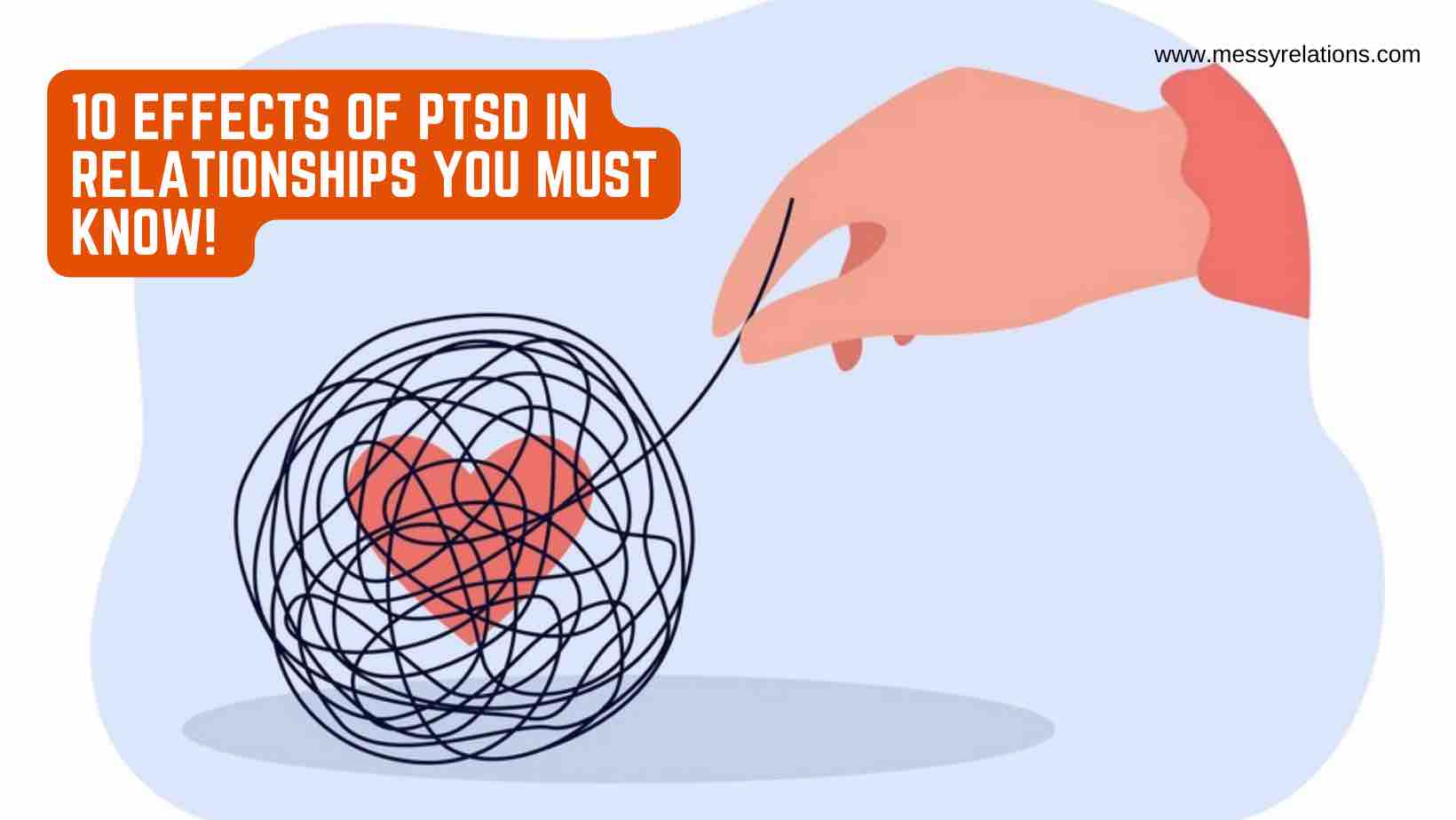Post-Traumatic Stress Disorder (PTSD) is not just an individual struggle; its ripples can be felt in the relationships of those affected. Understanding the effects of PTSD in relationships is essential for both individuals suffering from PTSD and their partners. Here we shed light on ten such effects, communicated in an informational yet conversational tone, suitable for everyone keen on understanding this complex subject.
1. Communication Breakdown
One of the primary effects of PTSD in relationships is the difficulty in communication. Individuals with PTSD might struggle to express their feelings and thoughts, leading to misunderstandings and feelings of isolation in the relationship.
2. Emotional Disconnection
PTSD can lead to emotional numbing or withdrawal as a defense mechanism against traumatic memories. This emotional disconnect can make partners feel distanced or neglected, impacting the emotional intimacy of the relationship.
3. Increased Anxiety and Stress
The constant state of hyperarousal and anxiety that accompanies PTSD can spill over into the relationship, creating a tense and stressful atmosphere. Partners may feel like they are walking on eggshells, unsure of how to provide support without triggering a negative response.
4. Trust Issues
PTSD can erode the foundation of trust in a relationship. The affected individual might become suspicious or paranoid, wrongly interpreting their partner’s actions as harmful or deceitful.
5. Intimacy Challenges
Both emotional and physical intimacy can be impacted by PTSD. Traumatic experiences, especially those of a sexual nature, can make physical closeness challenging, while emotional barriers can hinder deep connections.
6. Conflicts and Arguments
The irritability and mood swings associated with PTSD can lead to increased conflicts and arguments. Minor disagreements can escalate quickly, creating a cycle of arguments and resentment.
7. Caretaker Fatigue
Partners of individuals with PTSD may find themselves in a caretaker role, which can be emotionally and physically draining. This can lead to burnout and a feeling of imbalance in the relationship.
8. Social Isolation
People with PTSD might avoid social interactions, which can lead to isolation for both partners. This can strain the relationship as it limits opportunities for shared experiences and social support.
9. Negative Coping Mechanisms
Individuals with PTSD might turn to unhealthy coping mechanisms like substance abuse, which can further complicate and strain the relationship.
10. Impact on Physical Health
The stress of navigating PTSD in relationships can have physical repercussions for both partners, including issues like sleep disturbances, headaches, and other stress-related health problems.
The effects of PTSD in relationships are far-reaching and complex. It’s important for both partners to acknowledge these challenges and work towards understanding and supporting each other. Seeking professional help, maintaining open communication, and building a supportive network are key to navigating these difficulties. With empathy, patience, and the right support, relationships can adapt and grow stronger despite the presence of PTSD.
FAQs – Frequently Asked Questions
1. Can PTSD Cause Relationship Problems?
Yes, PTSD can cause relationship problems. The symptoms of PTSD, such as emotional withdrawal, irritability, anxiety, and flashbacks, can create significant challenges in communication, intimacy, and trust within a relationship. These issues often require both partners to work together actively and may necessitate professional guidance to navigate successfully.
2. How to Deal with Someone with PTSD in a Relationship?
Dealing with someone with PTSD in a relationship involves patience, understanding, and empathy. It’s important to educate yourself about PTSD, communicate openly and supportively, and encourage professional treatment. Providing a safe and stable environment, being mindful of triggers, and taking care of your own emotional needs are also crucial. Remember, professional guidance can be beneficial for both partners.
3. Can Being in an Abusive Relationship Cause PTSD?
Yes, being in an abusive relationship can cause PTSD. Prolonged exposure to abuse, whether physical, emotional, or sexual, can lead to the development of PTSD. The traumatic impact of abuse can result in lasting psychological effects, including flashbacks, severe anxiety, and other symptoms characteristic of PTSD.
4. What Does PTSD Look Like in a Relationship?
In a relationship, PTSD can manifest as difficulties in communication, emotional closeness, and trust. A person with PTSD might display increased irritability, anger outbursts, or withdrawal. They may also show hypervigilance, anxiety, and avoidance of situations or discussions that trigger memories of the trauma. These symptoms can create a challenging dynamic, affecting both partners and the overall health of the relationship.
5. Can I Have PTSD After Being in an Abusive Relationship?
Yes, it is possible to develop PTSD after being in an abusive relationship. The traumatic experiences of abuse can trigger PTSD symptoms such as flashbacks, severe anxiety, avoidance behaviors, and changes in mood and thought patterns. If you suspect you have PTSD following an abusive relationship, it is important to seek professional help for assessment and treatment.
6. Can relationships actually improve after addressing PTSD?
Yes, relationships can improve after addressing PTSD. Working through such challenges can foster deeper understanding, empathy, and stronger emotional connections.
7. How can I tell if PTSD is affecting my relationship?
If you notice ongoing communication issues, emotional distance, increased stress, or changes in intimacy, these could be signs that PTSD is affecting your relationship.
8. What should I do if I think my partner has PTSD?
Encourage your partner to seek professional help. Be supportive and patient, and educate yourself about PTSD to better understand what they are going through.
9. Is it common for both partners to need support in a relationship affected by PTSD?
Yes, it’s common and often necessary for both partners to seek support. This can come in the form of individual therapy, couples counseling, or support groups.


